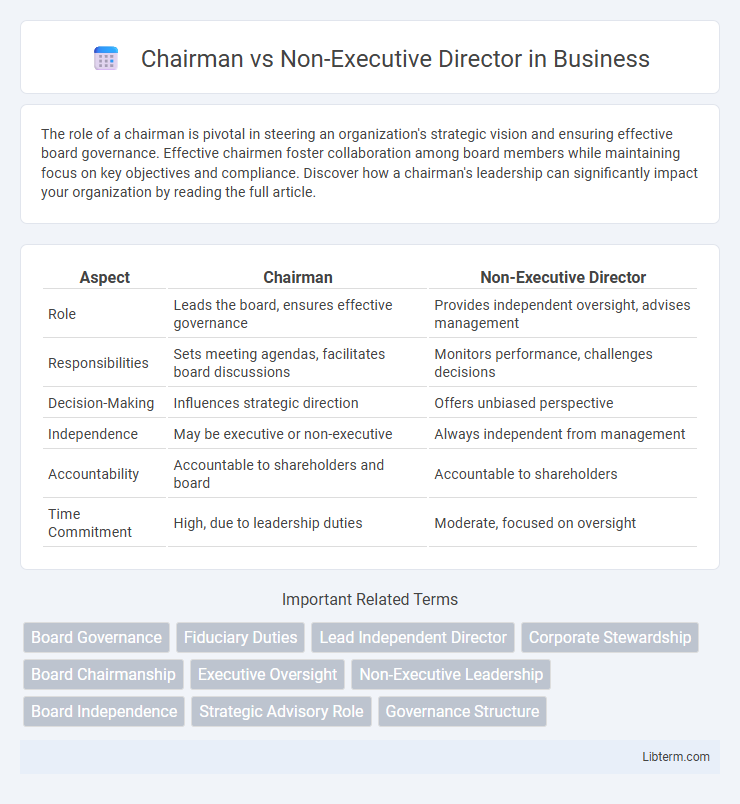The role of a chairman is pivotal in steering an organization's strategic vision and ensuring effective board governance. Effective chairmen foster collaboration among board members while maintaining focus on key objectives and compliance. Discover how a chairman's leadership can significantly impact your organization by reading the full article.
Table of Comparison
| Aspect | Chairman | Non-Executive Director |
|---|---|---|
| Role | Leads the board, ensures effective governance | Provides independent oversight, advises management |
| Responsibilities | Sets meeting agendas, facilitates board discussions | Monitors performance, challenges decisions |
| Decision-Making | Influences strategic direction | Offers unbiased perspective |
| Independence | May be executive or non-executive | Always independent from management |
| Accountability | Accountable to shareholders and board | Accountable to shareholders |
| Time Commitment | High, due to leadership duties | Moderate, focused on oversight |
Understanding the Roles: Chairman vs Non-Executive Director
The Chairman leads the board of directors, setting strategic agendas and ensuring effective governance, while a Non-Executive Director provides independent oversight without involvement in daily management. Chairmen typically have a pivotal role in board meetings, influencing decision-making processes, whereas Non-Executive Directors focus on monitoring corporate performance and risk. Both roles are essential for balanced corporate governance, promoting accountability and shareholder interests.
Key Responsibilities of a Chairman
The Chairman oversees the board's overall effectiveness, setting agendas, facilitating discussions, and ensuring robust governance practices align with corporate strategy. They act as the primary liaison between the board and executive management, steering decision-making processes and maintaining board cohesion. Unlike Non-Executive Directors who provide independent oversight and challenge management, the Chairman holds a leadership role, driving board dynamics and long-term strategic direction.
Core Duties of a Non-Executive Director
Non-Executive Directors (NEDs) primarily provide independent oversight, challenge executive decisions, and ensure corporate governance compliance without engaging in daily management. Their core duties include safeguarding shareholder interests, contributing to strategic planning, and monitoring financial performance and risk management frameworks. Unlike Chairmen who lead board meetings and represent the company externally, NEDs focus on accountability and ethical stewardship within the board.
Appointment and Selection Process
The appointment of a Chairman typically involves a formal election by the board of directors or shareholders, emphasizing leadership experience, strategic vision, and the ability to preside over board meetings. Non-Executive Directors are selected based on their expertise, independence, and capacity to provide unbiased oversight, often through a nomination committee that assesses candidates' qualifications and conflicts of interest. Both roles require rigorous vetting to ensure alignment with corporate governance standards and regulatory compliance.
Authority and Decision-Making Power
The Chairman typically holds greater authority and decision-making power within a company, often leading the board and setting strategic direction. Non-Executive Directors have a supervisory role, providing independent oversight without involvement in daily operations or executive decisions. Their influence centers on governance and accountability rather than direct control over management.
Independence and Objectivity
The Chairman typically holds a leadership role with significant influence over board meetings and company strategy, which can impact their independence and objectivity. In contrast, a Non-Executive Director (NED) is appointed to provide independent oversight and impartial judgment without involvement in daily management, ensuring unbiased scrutiny of the board's decisions. The independence of NEDs is critical for maintaining balanced governance, whereas Chairmen must balance leadership duties with minimizing conflicts of interest to uphold objective board oversight.
Relationship with the Board and Management
The Chairman provides leadership to the board, ensuring effective governance and strategic oversight while facilitating constructive dialogue between board members and senior management. Non-Executive Directors offer independent judgment and challenge management decisions without involvement in daily operations, enhancing board accountability. Their relationship with management is primarily advisory, maintaining a balance between oversight and support to protect shareholder interests.
Legal and Regulatory Obligations
The Chairman holds primary legal responsibility for ensuring board compliance with corporate governance standards and regulatory requirements, including overseeing board meetings and shareholder communications. Non-Executive Directors (NEDs) are legally obligated to exercise independent judgment, monitor executive management, and contribute to risk oversight without engaging in daily operations. Both roles are bound by fiduciary duties, but the Chairman's role entails a higher level of accountability in facilitating board effectiveness and regulatory adherence.
Remuneration and Performance Evaluation
Chairman remuneration typically reflects their leadership responsibility and strategic oversight, often including fixed fees and performance-related bonuses tied to company milestones or shareholder value. Non-Executive Directors receive fees primarily for their advisory role and board participation, with remuneration often less linked to direct company performance to maintain independence. Performance evaluation for Chairmen focuses on governance effectiveness and stakeholder engagement, while Non-Executive Directors are assessed on contribution to board discussions, risk oversight, and compliance adherence.
Impact on Corporate Governance
The Chairman plays a pivotal role in shaping corporate governance by leading the board, setting strategic agendas, and ensuring effective communication between management and shareholders. Non-Executive Directors contribute by providing independent oversight, challenging executive decisions, and safeguarding shareholder interests without engaging in daily operations. Together, their complementary roles enhance board accountability, transparency, and the overall governance framework within the organization.
Chairman Infographic

 libterm.com
libterm.com